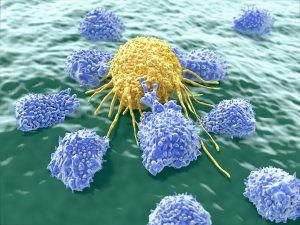Harvard researchers are testing a new approach to curing cancer. They are taking natural herbal remedies and apply them in cancer treatment.
Recent publication regarding a new approach to cancer treatment
While tumor suppressors are not new, Harvard researchers and others have now shown that strengthening tumor suppressors can after all heal cancer. They used prostate cancer in mice as a model to show that tumor suppressors can be strengthened. They published the results in the medical journal Science.
In short, the following points explain what the researchers did:
- The protein PTEN has been known as a tumor suppressor. It is weakened or sometimes absent in many cancers in humans or mice.
- Many tumors such as prostate, breast or liver cancer produce a WWP1 protein that weakens the PTEN suppressor function. In essence, this means that the immune system is too weak to fight the cancer.
- The researchers found that indole-3 carbinol, a derivative of cruciferous vegetables inhibits the WWP1 protein. This has been the background on which the publication of the link above was based altogether.
Other publications about the tumor suppressor protein PTEN
Unfortunately the Science publication does not allow free access to the entire paper, only to a summary. There is no mentioning of the details of the mouse experiments.
But we know from other studies that loss of the protein PTEN is very often found in samples from prostate cancer surgeries.
Dr. Pier Paolo Pandolfi, Director of the Cancer Center and Cancer Research Institute at Beth Israel Deaconess Medical Center said:”We found a new important player that drives a pathway critical to the development of cancer”.
The New York Times has summarized Dr. Pandolfi’s research as well.
Indole-3 carbinol, a simple supplement you can buy in the health food store, is destroying the WWP1 protein of various cancers. This in turn allows the essential PTEN protein to recover and attack various cancers. The image depicts how cytotoxic lymphocytes attack a cancer cell.
Conclusion
Dr. Pier Paolo Pandolfi’s team has detected that indole-3 carbinol, a derivative of cruciferous vegetables inhibits the WWP1 protein. In essence, this is a protein that various cancers produce to undermine the PTEN protein, an important cancer suppressor. Apparently the team has done mouse experiments where the survival showed significant improvements through the use of indole-3 carbinol. Details are not easily available in the literature. More clinical trials are necessary to show that this is effective in human prostate cancer, liver cancer or breast cancer. Overall indole-3 carbinol has one big advantage. In comparison to new chemotherapeutic agents, it is already commercially available. But on balance, clinical trials will take some more time.







